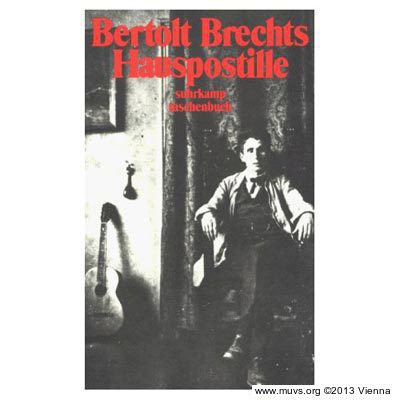Bertholt Brecht: The Ballade of Paragraph 218 (1929)
“Please, doctor. I’ve missed my monthly...”
Why, this is simply great!
If I may put it bluntly
You’re raising our birthrate.
“Please, doctor, now we’re homeless...”
But you’ll have a bed somewhere
So best put your feet up, moan less
And force yourself to grin and bear.
You’ll make a simply splendid little mummy
Producing cannon-fodder from your tummy
That’s what your body’s for, and you know it,
what’s more
And it’s laid down by law
And now get this straight:
You’ll soon be a mother, just wait.
“But, doctor, no job or dwelling:
My man would find kids the last straw...”
No, rather a new compelling
Objective to work for.
“But, doctor...” Really, Frau Griebel
I ask myself what this means
You see, our state needs people
To operate our machines.
You’ll make a simply splendid little mummy
Producing factory fodder from your tummy
That’s what your body’s for,
and you know it, what’s more
And it’s laid down by law
And now get this straight:
You’ll soon be a mother, just wait.
“But, doctor, there’s such unemployment...”
I can’t follow what you say.
You’re all out for enjoyment
Then grumble at having to pay.
If we make a prohibition
You bet we’ve a purpose in mind.
Better recognize your condition
And once you’ve agreed to put yourselves in
our hands, you’ll find
You’re a simply splendid little mummy
Producing cannon fodder from your tummy
That’s what your body’s for,
and you know it, what’s more
And it’s laid down by law
And now get this straight:
You’ll soon be a mother,
just wait.
The writer Bert Brecht (1898–1956) was one of many artists who called for the repeal of Paragraph 218, which dealt with abortion, in Germany in the 1920s, or at least impunity when an abortion was obtained during the first trimester. Part of the reason for this struggle was the serious economic crisis, which caused suffering among large segments of the population. The number of abortions rose accordingly, to approximately half a million annually by the end of the decade. This happened in spite of the legal punishment in place: in 1926, the penalty for abortion was reduced from five years of imprisonment with hard labour to ‘just’ jail time. While abortions for medical reasons were legalised in 1927, social and economic factors were still not taken into account.
Brecht dealt with this controversial theme in his 1922 poem ‘Concerning the Infanticide, Marie Farrar’, and later in other works, though in a more roundabout way. In 1929, his ‘The Ballade of Paragraph 218’ described the desperate situation of a female labourer in brutal clarity. She tells her doctor of the life she’s confronted with: homelessness and an unemployed husband. But instead of receiving help, she’s sent away and reminded of her ‘duty as a wife and mother’.
